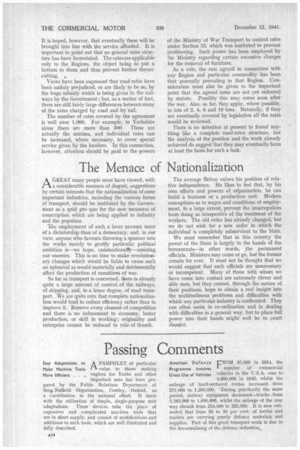The Menace of Nationalization
Page 16

If you've noticed an error in this article please click here to report it so we can fix it.
AGREAT many people must have viewed, with a considerable measure of disgust, suggestions by certain interests that the nationalization of some important industries, including the various forms of transport, should be instituted by the Government as a quid pro quo for the new measures of conscription which are being applied to industry and the populace.
The employment of such a lever savours more of a dictatorship than of a democracy, and, in our view, anyone who favours throwing a spanner into the works merely to gratify particular political ambition is—we hope, nnintentionalty—assisting our enemies. This is no time to make revolutionary changes which wOuld be liable to cause such an upheaval as would materially and detrimentally affect the production of munitions of war.
So far as transport is concerned, there is already quite a large amount of control_of the railways, of shipping, and, in a lesser degree, of road transport. We are quite sure that complete nationalization would tend to reduce efficiency rather than to improve it. Remove every element of competition and there is no inducement to economy, better production, or skill in working ; originality and enterprise cannot be reduced to rule Of thumb. The average Briton values his position of relative independence. He likes to feel that, by his own efforts and powers of ofganization, he can build a business or a production unit. Modern conceptions as to wages and conditions of employment, t'o a large 'extent, prevent the unscrupulous from doing so irrespective of the treatment of the workers. The old order has already changed, but we do not wish for a new order in which the individual is completely subservient to the State.
We must remember that in this country the power of the State is largely in the hands of the bureaucrats—in other words, the permanent officials, Ministers may come or go, but the former remain for ever. It must not be thought that we would suggest that such officials are unnecessary or incompetent. Many of those with whom we have come into contact are extremely clever and able men, but they cannot, through the nature of their positions, hope to obtain a real insight into the multitudinous problems and difficulties with which any particular industry is confronted. They can often assist in co-ordination and in dealing with difficulties in a general way, but to place full power into their hands might well be to court disaster.




















































